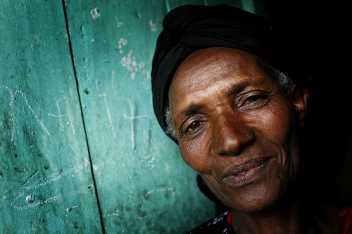 Rachel Albone, HelpAge’s HIV and AIDS Policy Adviser spent last week at the XVIII International AIDS Conference in Vienna. Here are some of her highlights:
Rachel Albone, HelpAge’s HIV and AIDS Policy Adviser spent last week at the XVIII International AIDS Conference in Vienna. Here are some of her highlights:
Sunday morning: We started with the World Health Organisation (WHO) consultation on Global AIDS strategy 2010-15. I haven’t been to an international meeting on HIV before that has focused so heavily on care and support and the contributions and needs of caregivers!
Caregivers like Awassa, above, who are supporting grandchildren who have lost their parents to HIV and AIDS. She told us that her biggest worry is not having enough money to support and feed her grandchildren.
Many people around the room gave WHO a very clear message on the need to include real caregivers like Awassa in their work. This is something we will definitely follow up on as the strategy is developed.
Monday evening: The Caregivers Action Network (CAN) organised a panel session in the main conference with six speakers including Kufekisa, a 67-year-old grandmother carer from Zambia. She spoke brilliantly about the challenges of providing care. She also spoke about how care and support feed into the other elements of universal access and strategies to improve support for older carers.
The panel was chaired by Hedia Belhadj, the new Director of Partnerships at UNAIDS, who recognised the need for UNAIDS to do more on care and support. Again, another really positive day.
Tuesday afternoon: We attended a panel session on social protection and HIV with CAN representative Agnes Atim from Uganda on the panel. She spoke about the breadth of social protection needed to support caregivers.
This means that the social protection and benefits agencies offer has to be more than cash if it is to include care and support in the way UNAIDS wants. She also highlighted brilliantly the role of older carers and made a call for universal pensions.
Wednesday afternoon: Kufekisa ambushed Michel Sidibe, the Executive Director of UNAIDS, to ask why he failed to mention care and support and caregivers in his opening address to the conference despite it being a pillar of universal access with prevention and treatment!
Cameras were snapping pictures of her holding his hand and giving him a talking to. Fantastic! He tells us he will do better in future and CAN is discussing with our UNAIDS contacts how to ensure he does.
Wednesday evening: We went to a panel session on HIV and ageing with presentations on older people living with HIV. The session was chaired by the new Director of HIV and AIDS at WHO. He opened the session by recognising the issue had been hugely overlooked and closed by saying it was one of the best sessions he had attended all week. The WHO partnerships adviser said the same thing at our CAN morning caucus the next day.
CAN in the future: We spent Thursday planning CAN’s advocacy work in the coming year. We have a huge list of things to do as a network at international, regional, national and community level.
One of the nicest things this week was when one of our caregivers, also living with HIV, stood at our closing meeting to thank HelpAge, VSO, Cordaid and Huairou Commission and said that CAN is her network and all caregivers’ network.
We want grassroots caregivers to feel ownership of it and to drive it forward with us, and we seem to have achieved that!
Read more about HelpAge’s work on HIV and AIDS.
